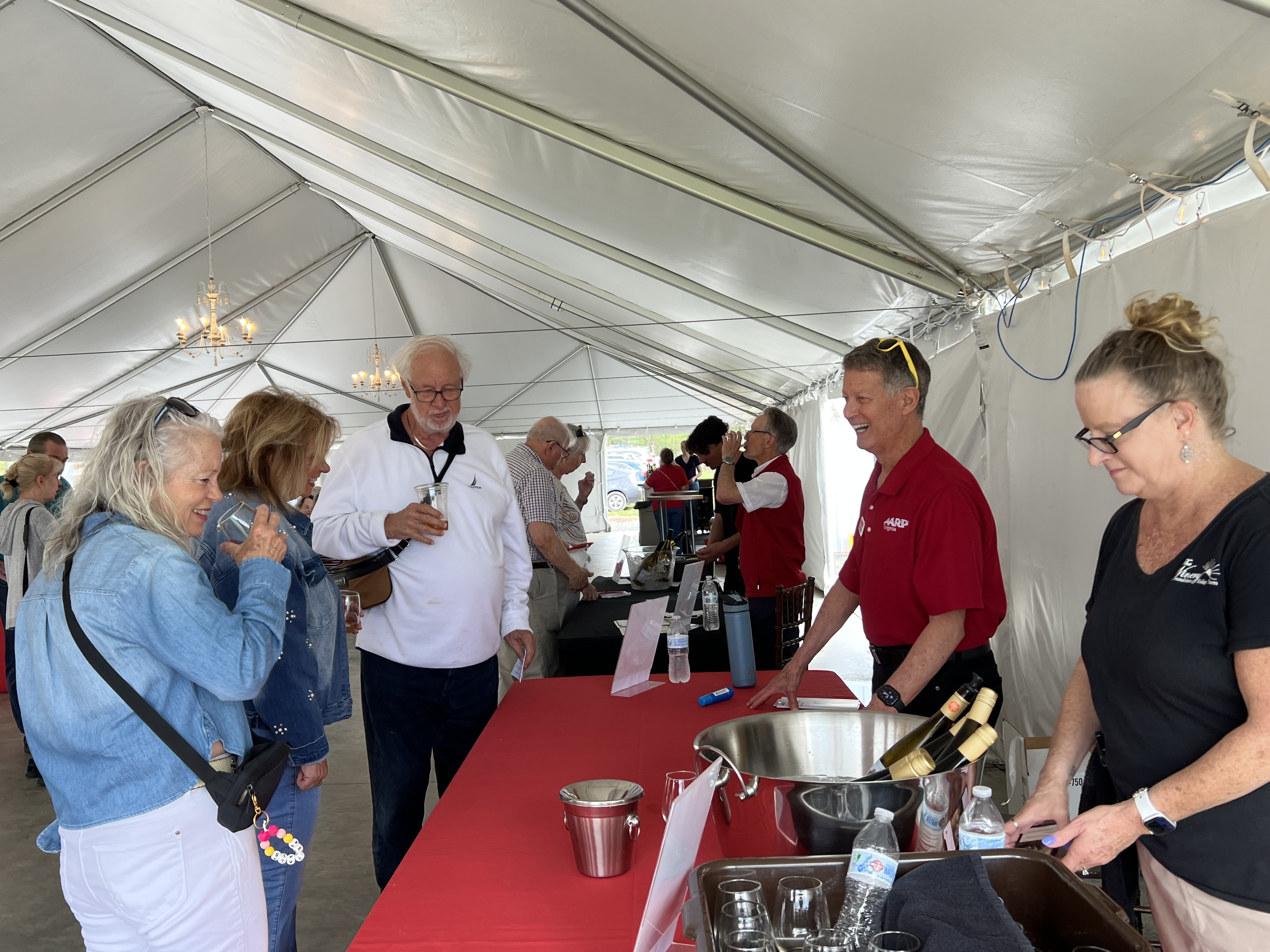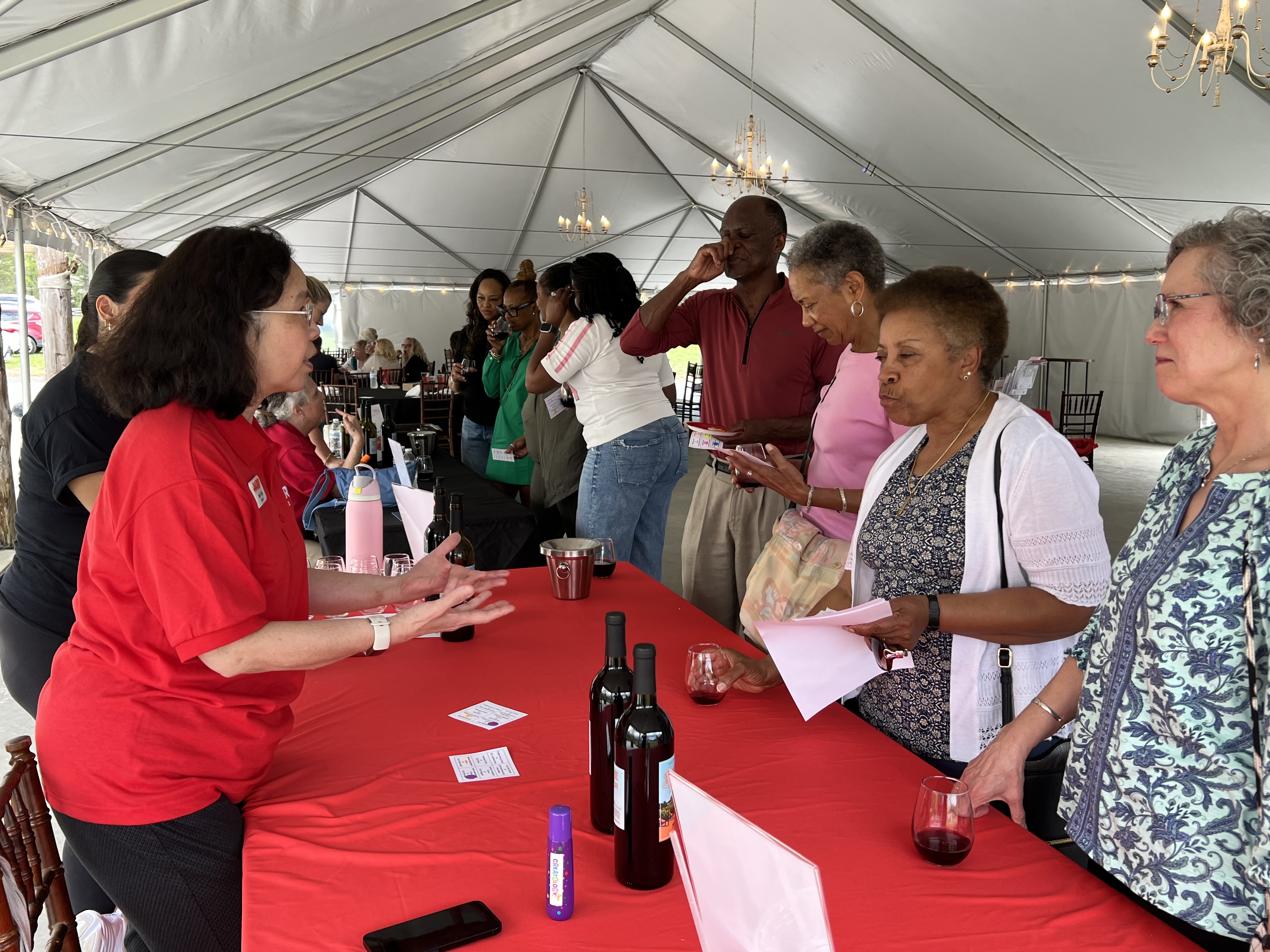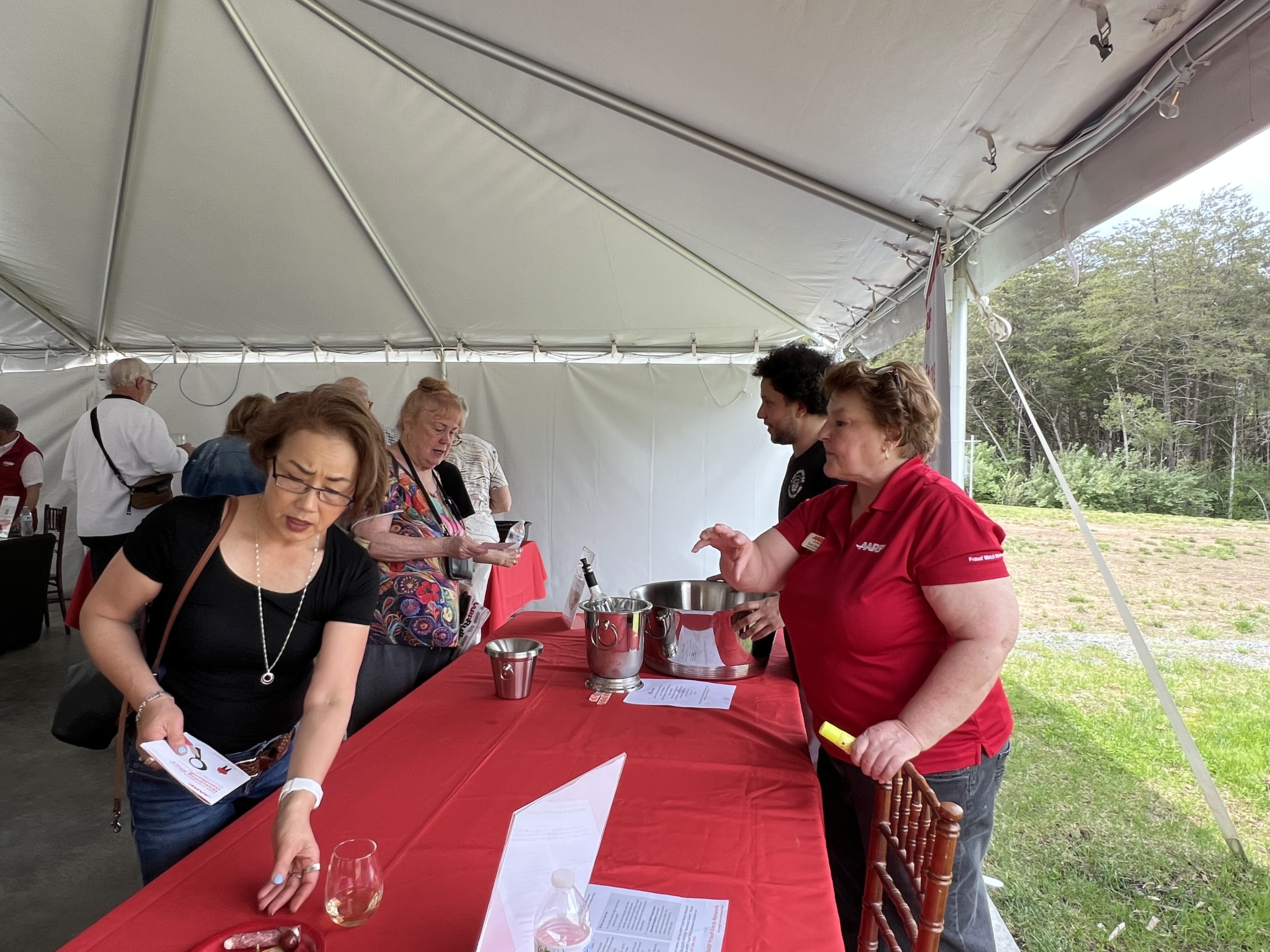AARP Hearing Center

You don’t normally think of wine paired with scam information, but attendees at a recent event found this combination worked very well.
The event, held at The Winery at Sunshine Ridge Farm in Gainesville, Virginia, featured information about different scams paired with pours of the winery’s wines. Six AARP Virginia volunteers each shared information about a specific scam that targets older adults, including how to recognize and protect oneself from the scam. Scams covered included:
Cryptocurrency Fraud
“I’m not sure I even know what cryptocurrency is,” one attendee told volunteer Navjeet Chabbewal. This lack of understanding is precisely why this fraud is successful.
Crypto scams typically originate with a phone call or message from someone claiming to be a trusted source, such as a utility company, saying they will cut off power because of an overdue account.
The caller tells the victim the easiest way to avoid shutoff is to withdraw money in cash from their financial institution and go to a nearby crypto ATM, often located in a convenience store or gas station.
Once the cash is fed into the crypto ATM, it is converted to cryptocurrency and deposited into the criminal’s account. For victims, there is little chance of recovering the money.
Chabbewal warned visitors to always contact the business directly if they get an unexpected call from someone representing a business with which they are associated, either by accessing them through an app or website or calling the number on a statement. Never respond to a text link or call back a phone number given by the initial caller.
Wine pairing: 2022 Cabernet Franc. The complex flavors of sweet, dried strawberry, black raspberry, and green peppercorns in this wine mirror the intricate and often confusing world of cryptocurrency fraud. The balanced acidity and soft tannins also reflect the deceptive allure of these frauds.
Jury Duty Scams
“The government is never going to call you to say they will arrest you if you don’t send money,” said volunteer Larry Lipman. This long-running form of government imposter scam is successful because most Americans expect to be called to jury duty at some point.
This scam typically originates with a phone call from someone purporting to be a government official, such as a U.S. Marshall or sheriff’s officer. The caller tells the victim they face imminent arrest for not appearing for jury duty, and the only recourse is to pay a hefty fine via credit card, gift card, or money transfer.
Often, the caller knows additional information about the victim, such as former addresses or employment history. They may request the victim to meet them at the local courthouse to help further the sense of legitimacy, but they meet outside the courthouse rather than inside at an actual office.
If you get such a phone call from someone claiming to be a U.S. Marshall or court official about missed jury duty, hang up immediately, advised Lipman. Genuine court documents and jury summons always come by mail, not by phone or email.
Lipman also advised checking with relevant local, state, or federal courts to see if you have been sent a summons. Contact information can be found on the specific court’s website.
Wine pairing: 2023 Vidal Blanc. The floral notes of white flower blossom and honeysuckle, along with the light-bodied tropical flavors, can symbolize the seemingly official and trustworthy nature of jury duty scams that often catch people off guard. The green apple and citrus finish can represent the sour experience victims have when they realize they’ve been scammed.

Romance Scams
Romance scams are more subtle than many other scams, said volunteer Trudy Marotta, because they take a much longer time to gain the victim’s trust and to make an emotional connection.
These scams may start with a dating site or a connection on social media. The scammer will try to learn as much about the victim as possible, such as shared experiences or interests. The goal is to steal everything from the victim. Often, they’ll claim some kind of emergency where they need money fast, and the trusting victim will comply to help them.
One of the red flags for romance scams are the scammer wants to leave the dating site or social media platform to communicate via email or instant messaging. This is because most dating and social media sites can detect and block scams.
Other flags are the person professing love too quickly, claiming to be from the U.S. but travelling or working overseas and planning to visit but cancelling at the last minute.
To protect yourself, “be careful not to overshare online,” said Marotta. Posting you are lonely or recently widowed, for example, exposes vulnerability and sets you up as a potential target.
Another way to protect yourself from scammers is to always discuss new love interests with family and friends, especially if there are any doubts or concerns. Never send money to or agree to an investment with someone you’ve only met online, and if you think you are being scammed, sever all communication.
Wine pairing: 2022 Rosé. The notes of strawberries and cream, shortbread and baked cherry pie in this Rosé are perfect for highlighting scams that exploit emotional connections. The hint of sweetness and clean finish can symbolize the initial allure and eventual heartbreak often associated with romance scams.
Celebrity Imposter Scams
Celebrity scams often use artificial intelligence (AI) to impersonate celebrities, said volunteer Vic Martin. Just three seconds of actual audio is enough for scammers to reproduce a celebrity’s voice.
These scams can take several different forms. A victim may get a call from a “celebrity” or someone representing the celebrity, offering exclusive access for special fans in return for thousands of dollars.
Another form is fake celebrity endorsements, which have targeted celebrities such as Taylor Swift, Jennifer Anniston and Dolly Parton. These ads have the celebrity endorsing various products or shilling an investment opportunity, all of which are fake.
Other schemes may request donations to a charity, sometimes even an actual charity supported by the celebrity.
Protection against these scams include being cautious about posting to celebrity or fan pages. Since these pages are public, anyone can reach out to fans pretending to be the actual celebrity or the celebrity’s representative.
Also be cautious of any interaction. An actual celebrity will not send private messages to fans to solicit funds for any reason. If a charity is involved, do research to assure it is a legitimate tax-exempt 501(c)3 organization.
Wine pairing: 2022 Viognier. The fragrant scents of cantaloupe, vanilla cream and dried wildflowers in this Viognier mirror the allure and deception of celebrity imposter scams. The full mouth feel and creamy texture can symbolize the seemingly glamourous but ultimately fraudulent nature of these scams.

Medical Equipment Scams
In this scam, someone reaches out by offering a brace, a wheelchair, diabetes test strips or other devices for “free,” as in “Medicare will pay for it.” The approach may be a phone call, an advertisement or someone at a health fair or similar event.
The problem, said volunteer Marsha Martin, is not only is Medicare being defrauded, but by accepting this equipment the victim may be responsible for up to 20 percent of the Medicare-approved cost of the item, which the victim may have to pay out of pocket.
Often, the victim will get a call saying they are eligible for free equipment and the caller will request the victim’s Medicare or Social Security number so they can bill Medicare. The criminals may then send the victim a low-cost item while billing Medicare for a more expensive version.
Sometimes, the victim receives items they didn’t request, which the scammers bill to Medicare. Charges may appear on the victim’s Medicare statement for equipment never authorized by a doctor.
Medicare representatives never make unsolicited calls, so hang up if you receive a call claiming to offer equipment. Never give out your Medicare number to anyone other than trusted healthcare providers. And don’t accept delivery of equipment unless you know it was ordered by your doctor.
Wine pairing: 2022 Petit Verdot. The bold flavors of dried cherries, black currant and licorice, along with hints of warm wood and pepper, can symbolize the strong and structured nature of these scams. The well-structured tannins and medium finish reflect the deceptive tactics used to convince victims of the fraudulent medical equipment offers.
Home Improvement Scams
Most homeowners have experienced someone showing up at their door and offering to perform work for you, often based on some issue they happened to notice driving by. They’ll provide a low-ball quote for a cash payment, but any work they end up doing, if anything, is substandard.
Other contractors can be more deceptive, said volunteer Jane Tang, especially if the homeowner is seeking bids for a larger project. The scammer will offer a discount, accept a substantial cash deposit, and then vanish.
The demand for cash up front and turning up uninvited are red flags. Most good contractors are busy and don’t search for business door-to-door, nor are they available to start immediately.
Sometimes a scammer may show up and say they were working nearby and have excess materials, offering a deal to fix a walkway, for example. But any work they do is incomplete or shoddy.
To protect yourself from contractor scams, always ask for referrals, review references, ask for photos of their work on similar projects, and check their license. Get multiple bids and read the fine print before signing a contract.
Wine pairing: 2021 Meritage. The aromas of earth, moss and smoky oak in this Meritage can represent the deceptive tactics used in home improvement scams. The flavors of cherries, raspberries and currants, along with the long finish and balanced acidity, can symbolize the seemingly appealing but ultimately fraudulent nature of these scams.
Attendees said the event was both fun and informative and some shared stories of their own scam experiences or experiences of someone they know. Many lingered to enjoy the charcuterie board and additional glasses of wine.
For more information on how to identify and avoid fraud, contact the AARP Fraud Watch Network. If you think you have experienced a scam, you can get support from AARP by calling the Fraud Watch Hotline at 877-908-3360 or seek victim support online.































































